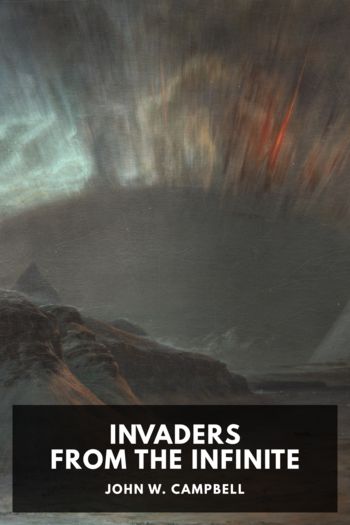Invaders from the Infinite, John W. Campbell [the kiss of deception read online TXT] 📗

- Author: John W. Campbell
Book online «Invaders from the Infinite, John W. Campbell [the kiss of deception read online TXT] 📗». Author John W. Campbell
“I think that is the best plan. Do you agree?”
“Arcot,” asked Morey slowly, “if this race attempts to settle another Universe, what would that indicate of their own?”
“Hmmm—that it was either populated by their own race or that another race held the parts they did not, and that the other race was stronger,” replied Arcot. “The thought idea in their minds has always been a single world, single solar system as their home, however.”
“And single solar systems cannot originate in this Space,” replied Morey, referring to the fact that in the primeval gas from which all matter in this Universe and all others came, no condensation of mass less than thousands of millions of times that of a sun could form and continue.
“We can only investigate—and hope that they do not inhabit the whole system, for I am determined that, unpleasant as the idea may be, there is one race that we cannot afford to have visiting us, and it is going to be permanently restrained in one way or another. I will first have a conference with their leaders and if they will not be peaceful—the Thought can destroy or make a Universe! But I think that a second race holds part of that Universe, for several times we have read in their minds the thought of the ‘Mighty Warless Ones of Venone.’ ”
“And how do you plan to destroy so large a planet as these are?” asked Morey, indicating the telectroscope screen.
“Watch and see!” said Arcot.
They shot suddenly toward the distant sun, and as it expanded, planets came into view. Moving ever slower on the time control, Arcot drove the ship toward a gigantic planet at a distance of approximately 300,000,000 miles from its primary, the sun of this system.
Arcot fell into step with the planet as it moved about in its orbit, and watched the speed indicator carefully.
“What’s the orbital speed, Morey?” asked Arcot.
“About twelve and a half miles per second,” replied the somewhat mystified Morey.
“Excellent, my dear Watson,” replied Arcot. “And now does my dear friend know the average molecular velocity of ordinary air?”
“Why, about one-third of a mile a second, average.”
“And if that planet as a whole should stop moving, and the individual molecules be given the entire energy, what would their average velocity be? And what temperature would that represent?” asked Arcot.
“Good—Why, they would have to have the same kinetic energy as individuals as they now have as a whole, and that would be an average molecular velocity in random motion of 12.5 miles a second—giving about—about—about—twelve thousand degrees centigrade!” exclaimed Morey in surprise. “That would put it in the far blue-white region!”
“Perfect. Now watch.” Arcot donned the headpiece he had removed, and once more took charge. He was very far from the planet, as distances go, and they could not see his ship. But he wanted to be seen. So he moved closer, and hung off to the sunward side of the planet, then moved to the night side, but stayed in the light. In seconds, a battlefleet was out attempting to destroy him.
Surrounding the ship with a wall of artificial matter, lest they annoy him, he set to work.
Directly in the orbit of the planet, a faint mistiness appeared, and rapidly solidified to a titanic cup, directly in the path of the planet.
Arcot was pouring energy into the making of that matter at such a rate that space was twisted now about them. The meter before them, which had not registered previously, was registering now, and had moved over to three. Three sols—and was still climbing. It stopped when ten were reached. Ten times the energy of our sun was pouring into that condensation, and it solidified quickly.
The Thessians had seen the danger now. It was less than ten minutes away from their planet, and now great numbers of ships of all sorts started up from the planet, swarming out like rats from a sinking vessel.
Majestically the great world moved on in its orbit toward the thin wall of infinite strength and infinite toughness. Already Thessian battleships were tearing at that wall with rays of all types, and the wall sputtered back little gouts of light, and remained. The meters on the Thought were no longer registering. The wall was built, and now Arcot had all the giant power of the ship holding it there. Any attempt to move it or destroy it, and all the energy of the Universe would rush to its defense!
The atmosphere of the planet reached the wall. Instantly, as the pressure of that enormous mass of air touched it, the wall fought, and burst into a blaze of energy. It was fighting now, and the meter that measured sun-powers ran steadily, swiftly up the scale. But the men were not watching the meter; they were watching the awesome sight of Man stopping a world in its course! Turning a world from its path!
But the meter climbed suddenly, and the world was suddenly a tremendous blaze of light. The solid rock had struck the giant cup, 110,000 miles in diameter. It was silent, as a world pitted its enormous kinetic energy against the combined forces of a universe. Soundless—and as hopeless. Its strength was nothing, its energy pitted unnoticed against the energy of five hundred thousand million suns—as vain as those futile attempts of the Thessian battleships on the invulnerable walls of the Thought.
What use is there to attempt description of that scene as 2,500,000,000,000,000,000,000,000 tons of rock and metal and matter crashed against a wall





Comments (0)